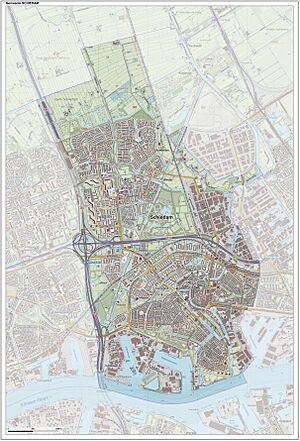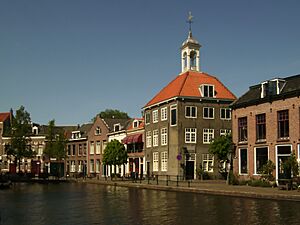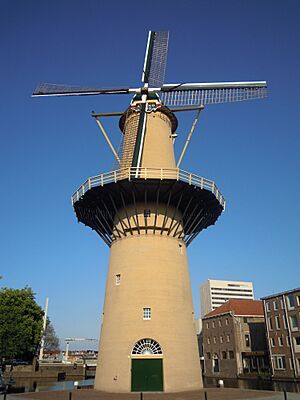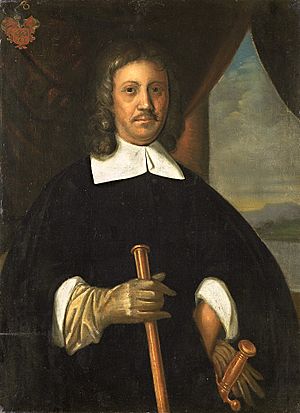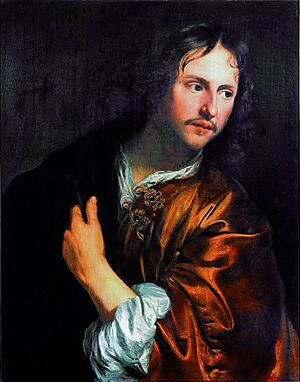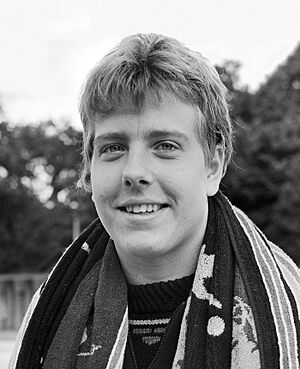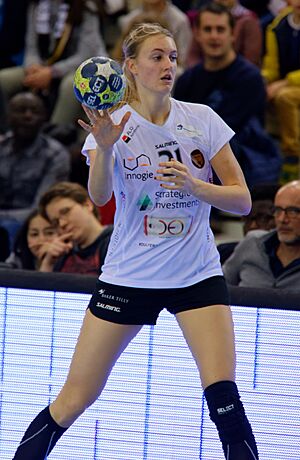Schiedam facts for kids
Quick facts for kids
Schiedam
|
|||
|---|---|---|---|
|
Town and municipality
|
|||
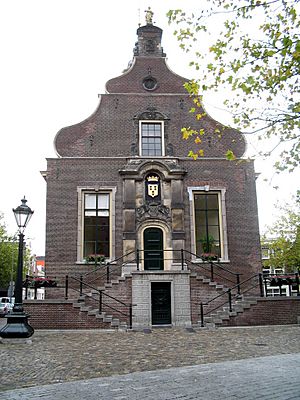
Old city hall of Schiedam
|
|||
|
|||
| Nickname(s):
Brandersstad
|
|||
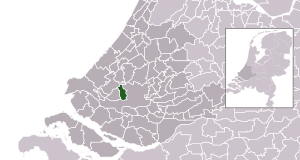
Location in South Holland
|
|||
| Country | Netherlands | ||
| Province | South Holland | ||
| Settled | c. 1230 | ||
| City rights | 1275 | ||
| Government | |||
| • Body | Municipal council | ||
| Area | |||
| • Total | 19.86 km2 (7.67 sq mi) | ||
| • Land | 18.02 km2 (6.96 sq mi) | ||
| • Water | 1.84 km2 (0.71 sq mi) | ||
| Elevation | −1 m (−3.3 ft) | ||
| Population
(May 2014)
|
|||
| • Total | 76,650 | ||
| • Density | 4,254/km2 (11,020/sq mi) | ||
| Demonym(s) | Schiedammer | ||
| Time zone | UTC+1 (CET) | ||
| • Summer (DST) | UTC+2 (CEST) | ||
| Postcode |
3100–3125
|
||
| Area code | 010 | ||
Schiedam is a cool town and municipality in the western part of the Netherlands. It's located in a big area with cities like Rotterdam and The Hague. Schiedam is west of Rotterdam, east of Vlaardingen, and south of Delft. It's also connected to the village of Pernis by a tunnel.
This town is famous for its old center with canals. It also has the tallest windmills in the world!
Schiedam is well-known for making a special kind of Dutch gin called jenever. This was a very important industry here a long time ago. Because of this, the town was even nicknamed "Black Nazareth."
The town is also known for Saint Lidwina. She is one of the most famous Dutch saints. Her special relics are kept in the town’s basilica.
Contents
Discovering Schiedam's Past
How Schiedam Began
Schiedam started around the year 1230. A powerful family, the Lord of Wassenaer, built a dam on the river Schie. This dam helped protect the land from the sea.
In 1247, Lady Adelaide of Holland received part of this dam as a gift. The dam became a busy place for trade. Goods had to be moved from ships to land here. Because of all this activity, a small town quickly grew around the dam.
In 1275, Lady Adelaide gave Schiedam "town privileges." This meant it could act more like a city. She also ordered a castle to be built, called Te Riviere Castle. You can still see parts of this old castle today!
Challenges and Growth
As a young town, Schiedam soon faced competition. Other towns like Rotterdam and Delft also built connections to the river Meuse.
From the 1400s, Schiedam became a popular place for people to visit. This was because of Saint Lidwina, a famous Dutch saint who lived there. The town also became important for herring fishing. Sadly, a big fire in 1428 destroyed many wooden buildings in Schiedam.
The Golden Age of Gin
In 1575, the world's first known commercial distillery opened in Schiedam. The 1700s were a "Golden Age" for the town. The gin industry grew a lot because less alcohol was coming from France.
Schiedam's jenever was sent all over the world. This industry gave the town its nickname, "Black Nazareth." Today, most of this industry is gone. But you can still see five very tall windmills. They had to be tall to rise above the big warehouses. Many old storehouses also remind us of this busy past. You can even visit the National Jenever Museum in one of the old factories.
Modern Times and Changes
In the 1800s and 1900s, Schiedam became a big center for shipbuilding. Companies like Wilton-Fijenoord built many ships here.
In 1941, some nearby areas joined Schiedam. This allowed the town to grow and build new homes. By the end of the 1900s, shipbuilding mostly stopped. Today, many people who live in Schiedam travel to work in the bigger Rotterdam area.
There were also some major train accidents near Schiedam's station in 1856 and 1976.
Where is Schiedam?
Schiedam is located in the South Holland province of the Netherlands. It's surrounded by Rotterdam to the east, Midden-Delfland to the north, Vlaardingen to the west, and the Nieuwe Maas river to the south.
The town is divided into nine main areas. These include the Center, East, South, West, and newer neighborhoods like Nieuwland and Groenoord.
Fun Things to See and Do
Museums to Explore
- Stedelijk Museum Schiedam (City Museum Schiedam)
- Jenever Museum (Gin Museum)
- Het Borrelmuseum (a small museum about drinks)
- De Walvisch (a windmill museum)
- Nationaal Coöperatie Museum Schiedam / 't Winkeltje (a museum about old shops)
- Artgallery 't Walvisch
Famous Buildings and Places
- The old town hall
- The beautiful canals of Schiedam
- The Wheat Exchange (De Korenbeurs)
- Church of Saint John (Grote of Sint-Janskerk)
- The ruins of Te Riviere Castle
- Saint Lidwina basilica
- De Plantage (a lovely park)
- The Porters' Guild House (a historic building)
- Het Proveniershuis (an old building that housed elderly people)
- The historical windmills of Schiedam. One of them is the tallest windmill in the world and is even used as a restaurant!
Exciting Events
- Brandersfeesten (a local festival)
- The National Windmill Days (when you can visit many windmills)
- Monthly art exhibitions at Artipico Art Gallery
Sports in Schiedam
The most popular sports in Schiedam are soccer and field hockey. The town used to have two professional soccer teams, SVV and Hermes. Both teams are no longer professional.
Cricket is also quite popular here. Schiedam has two cricket teams that play at the highest national level! For example, the Dutch capital Amsterdam only has one such team. The Hermes D.V.S. team has won two top-level titles, while their rivals Excelsior '20 have won eleven titles.
Learning in Schiedam
Schiedam has about 35 schools. The oldest high school is the Stedelijk Gymnasium Schiedam, which started way back in 1346! Other schools include Lyceum Schravenlant, Spieringshoek, and Lentiz LIFE.
Famous People from Schiedam
Public Service and Thinkers
- Saint Lidwina (1380–1433) - A Dutch mystic and saint.
- Cornelius Haga (1578–1654) - An ambassador for the Dutch Republic.
- Jan van Riebeeck (1619–1677) - He founded Cape Town in South Africa.
- Dirk Jan de Geer (1870–1960) - A former Dutch Prime Minister.
- Pieter van Vollenhoven (born 1939) - He is married to Princess Margriet of the Netherlands.
- Elizabeth Witmer (born 1946) - A politician from Canada.
Artists and Performers
- Adam Pynacker (1622–1673) - A Dutch painter known for landscapes.
- Wim Meuldijk (1922–2007) - He created the famous Dutch character Pipo de Clown.
- Rien Poortvliet (1932–1995) - A Dutch painter famous for his "Gnomes" book series.
- Joey Roukens (born 1982) - A Dutch composer of modern classical music.
Sports Stars
- Pauline van der Wildt (born 1944) - An Olympic swimmer who won a bronze medal.
- Yvonne Buter (born 1959) - An Olympic field hockey goalkeeper.
- John de Wolf (born 1962) - A former professional soccer player.
- Erik Jazet (born 1971) - A field hockey player who won medals in three Olympic Games.
- Rob Cordemans (born 1974) - A Dutch baseball player.
- Danny Koevermans (born 1978) - A former Dutch soccer player and coach.
- Gökhan Saki (born 1983) - A Dutch-Turkish kickboxer.
- Jos van Emden (born 1985) - A Dutch road bicycle racer.
- Kelly Dulfer (born 1994) - A Dutch handball player for the national team.
- Joshua Zirkzee (born 2001) - A Dutch football player.
Schiedam's International Friends
Schiedam used to be "twinned" with several cities around the world. This means they had special friendly relationships.
Some of these cities were:
 Vienne, France
Vienne, France Esslingen am Neckar, Germany
Esslingen am Neckar, Germany Piotrków Trybunalski, Poland
Piotrków Trybunalski, Poland Velenje, Slovenia
Velenje, Slovenia Neath Port Talbot, Wales
Neath Port Talbot, Wales Udine, Italy
Udine, Italy Wandsworth, England
Wandsworth, England
These special relationships ended in 2008 when Schiedam joined a group called Eurotowns.
Images for kids
See also
 In Spanish: Schiedam para niños
In Spanish: Schiedam para niños
 | Bessie Coleman |
 | Spann Watson |
 | Jill E. Brown |
 | Sherman W. White |



